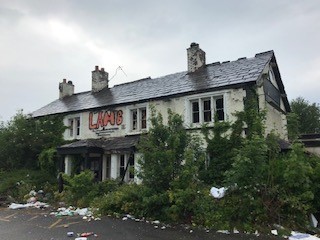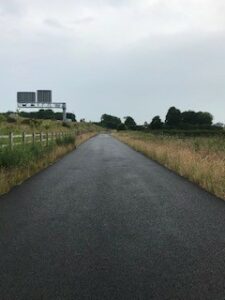Compulsory Purchase
The Cheshire Lounge

Today I appeared as a contributor to CPO Talking Heads in a discussion about the Upper Tribunal decision in The Cheshire Lounge case (Castlefield vs National Highways 2023). I acted as the expert witness in the case on behalf of the Claimant. This opinion piece is hopefully written with a degree of knowledge and understanding of the case.
By common consensus the case is of some significance not because of the financial determination, but due to some of the comments and assessments made by the Upper Tribunal in reaching that decision. I thought it would be helpful to set out my observations on the case and the judgment.
Brief Background
The Cheshire Lounge is a public house located close to the M56 at the Lymm Roundabout in Cheshire. It was accessed by a short road leading off the A556. National Highways cut off the access road in 2014 as part of their upgrade works to the A556. They promised to provide a new access road to the Public House which they duly did by building a 0.25-mile access road leading off the Lymm roundabout. Unfortunately, National Highways did not provide the owner with an easement to use the access road.

The then owner sold the property to my client Castlefield Property (‘Castlefield’) in 2017 for the purpose of redevelopment as part of their successful Alberts Restaurant brand. National Highways undertook to secure the easement for Castlefield should they not be able to negotiate an easement with the adjoining owner over whose land the new access road crossed. By this time the public house was dilapidated and ripe for redevelopment.
It was not possible for Castlefield to agree reasonable easement terms with the adjoining owner. This left Castlefield without access. National Highways refused to either step in or engage with Castlefield to remedy the position until 2021. The easement that they were prepared to offer Castlefield was inadequate to facilitate development and it was therefore necessary for Castlefield to make a Reference to the Upper Tribunal with the specific intention to oblige National Highways to provide the required easement and to claim compensation for their losses. The case was heard in May 2023 some 9 years after the loss of the access road and 6 years after the property was acquired by Castlefield.
There were 2 major points of note that arose out of the determination being the calculation of injurious affection and the role of expert witnesses.
Injurious Affection
For those who do not know too much about compulsory purchase it would be helpful to define what is meant by injurious affection. In essence it is compensation for the diminution in the value of the affected owner’s retained land. Injurious affection falls under Section 7 of the Compulsory Purchase Act 1965. In this case there were three elements of injurious affection:
- Loss of direct access to the public highway
- Quality of replacement access road.
- The 9 year delay from the loss of the access road to the provision of an easement in 2023.
For the loss of direct access to the highway and the poorer quality of the access road the Tribunal awarded compensation of 10% of the Market Value of the property (set at £1,200,000).
In assessing the compensation for a lack of a deed of easement the Tribunal judged that the appropriate compensation should be 20% making a total compensation assessment of 30%.
The 20% assessment was based on what was known on the Valuation date in 2014. In the words of the Tribunal:
‘The parties ultimately agreed that the assessment of the ‘after’ value should take account of what was known or anticipated at the valuation date, and not what might occur thereafter.’
The Tribunal asked the question as to what would have been known or anticipated by a reasonably prudent and properly advised purchaser.
In the words of the Tribunal
‘it would always be wrong to value land as if with knowledge of matters which were not known, and could not have been known, at the valuation date.’
As of 2014 there was no anticipation that the grant of the easement would be delayed by some 9 years. On surface value this does seem significantly unfair to the Claimant. However, to a certain extent the position was rectified by a cost of money claim award against National Highways of 5% interest over a 6-year period from 2017-2023.
The Tribunal stated that:
‘We agree that the two heads of claim (injurious affection and holding costs) are conceptually and legally distinct, but that does not mean that in an appropriate case they could not be alternatives or that the assessment of one could not have regard to compensation provided under the other. What matters is that the claimant is put in an equivalent position, so far as money can achieve it, to the position it would have been in if the reference land had not been taken.’
Whilst the Vesting Day assessment is consistent with compulsory purchase principles it does perhaps raise two challenges.
The first challenge is for Acquiring Authorities. Before taking land, they should ensure that full access rights are in place to put the affected owner in a position of equivalence or as close as possible to an equivalence position. Failure to do so is likely to result in a high level of interest being charged. It should be noted in The Cheshire Lounge case that interest was charged on a compound basis for 6 years at 5%. The assessment of this rate was very much calculated by the Claimant’s use of money and would generally be regarded as being much higher than statutory interest. This is illustrated by the fact that for most of the 2017-2023 time period the base rate was close to 0%. Failure to secure the necessary rights could lead to the acquiring authority paying high interest costs on a compound basis.
The second challenge is perhaps one that applies to the compensation code itself. In The Cheshire Lounge case the Claimant was helped by the fact that they acquired The Cheshire Lounge in 2017 for £1,232,500. It was therefore much easier to calculate the loss. What happens in a scenario where there is no acquisition and therefore no purchase price to apply the loss against? Perhaps the logical solution would be to apply the interest penalty against the Market Value of the Retained Property as at the date of valuation.
Expert Witnesses
An even more noteworthy aspect of this case related to the role of expert witnesses. The Tribunal’s judgment questioned whether a CPO compensation surveyor could act as an expert witness in Tribunal proceedings when they have previously had a role of advocating the quantum of compensation for the client concerned.
In the words of the Tribunal the Experts
‘have done their best to be objective, but to a greater or lesser extent that state of mind has proved to be unachievable, as it almost always proves to be unachievable by experts in their situation.’
The whole notion that surveyors who negotiate a claim cannot then be experts would run contrary to the way that many dispute issues have been handled over the decades. Logically this would also apply to rent reviews, lease renewals, rating appeals etc.
Several issues appear to arise from this assessment:
- Applying the ruling would result in two surveyors acting for the same client – one as advocate and the other as expert. The cost of the whole process will increase as it will be necessary to engage two surveyors and perhaps two planning advisors and two accountants. The Acquiring Authority should logically pick up this cost.
- There will be many situations where ‘the expert’ will not have seen the property concerned. This consideration would appear to undermine the extent that the 2nd surveyor can truly be described as experts.
- There could be situations where the appointed Expert holds a different view to the surveyor who have been running the case and it is necessary to amend pleadings to reflect a change of position. At what point should the second expert become involved?
- Compulsory purchase advice could become the domain of larger practices as a case will require a minimum of two CPO specialists to handle an instruction. Invariably the cost burden will increase making it more difficult for claimants to afford to take a case to Tribunal with uncertainty as to the cost position.
I suspect that this whole issue will be explored in further detail in other cases in the years ahead.
Summary
The whole case of the Cheshire Lounge has raised more issues than simply the settlement of disputed compensation and the provision of an easement. I have sought to unpack some of these issues above. Others will also have opinions on the matters raised.
Finally, I would acknowledge the significant role played in this case by the Claimant’s professional team that included Debbie Reynolds of TLT Solicitors and James Periera KC from FTB Chambers.
If you or your clients find yourselves affected by a CPO matter, the Roger Hannah compulsory purchase team would be happy to advise.





